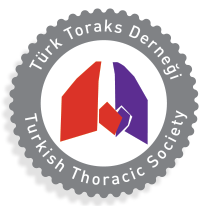Objective: To evaluate the influence of superior vena cava syndrome on the prognosis of cases with small cell lung cancer (SCLC), and on the complications due to the diagnostic procedures.
Design: A prospective, randomized and comparative study.
Setting: A chest diseases hospital
Patients: 29 SCLC patients with superior vena cava syndrome (SVCS) (Group I) and 29 SCLC patients without SVCS (Group II) were evaluated according to their survival times.
Results: One case with SVCS and two cases without SVCS were excluded from the study as they could not be followed. There were no serious complications related to the invasive diagnostic procedures [fever after bronchoscopy: 1 (3.6%) patient in group I and 1 (3.7%) patient in group II and hemoptysis due to bronchoscopy: 3 (10.7%) patients in group I and 2 (7.4%) patients in group II], There were no significant differences between the groups regarding complications. The cases with and without SVCS showed no significant difference regarding the prognostic factors for SCLC such as age (in group I mean age: 52.03±10.6 years, in group II mean age: 54.2±8.8 years), sex (group I male/female ratio: 27/1, group II male/female ratio: 25/2), stage of disease (group I limited/extensive disease ratio: 18/10, group II limited/exten- sive disease ratio: 14/13), performance of the patient (group I ECOG 0-2: 78.6%, group II ECOG 0-2: 85.2%), and serum lactate dehydrogenase (LDH) level (group I LDH mean: 466.9±195.9U/L, group II LDH mean: 435.2±255.1U/L) (p>0.05). Therapeutic response was 72% (partial and complete response rates: 60%, 12%, respectively) in group I and 64% (partial and complete response rates: 52%, 12%, respectively) in group II (p>0.05). The mean survival times of cases with and without superior vena cava syndrome were 41.8±27.8, 34.1±26.5 weeks, respectively (p=0.43, log-rank test). There were no significant differences between the groups regarding prognostic factors, and survival times (p>0.05).
Conclusion: Superior vena cava syndrome is not an unfavourable prognostic factor for small cell lung cancer. Invasive diagnostic procedures are not contraindicated in small cell lung cancer with superior vena cava syndrome.



.png)
